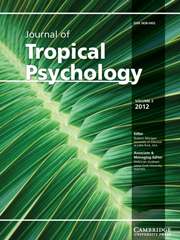Article contents
Exploring five factor model personality traits as predictors of burnout dimensions among college students in the Philippines
Published online by Cambridge University Press: 27 December 2016
Abstract
Burnout occurs among students when they suddenly lose interest in their studies due to feeling physically and emotionally drained. They experience further emotional depletion due to study demands, distrustfulness and detachment about their work. This study investigated the relationship between the Five-Factor Model (FFM) personality traits and burnout, as operationalised by Maslach's three dimensions of burnout, namely exhaustion, cynicism and reduced personal efficacy. Previous Western research was replicated in order to contribute to the cross-cultural literature on burnout. The Maslach Burnout Inventory – Student Survey University Form and the NEO – Personality Inventory Revised Form S were subjected to stepwise forward regression using FFM factors and facets to predict the scores on each burnout dimension. Five hundred and seventy-seven Filipino college students (age 17 to 24) from private universities and colleges within Metro Manila participated. Results revealed that neuroticism and conscientiousness predict all three burnout constructs. However, certain facets of neuroticism and conscientiousness are more important than others. At the facet level, facets of agreeableness and openness contributed to prediction of burnout as well.
- Type
- Articles
- Information
- Copyright
- Copyright © The Author(s) 2016
References
- 1
- Cited by


